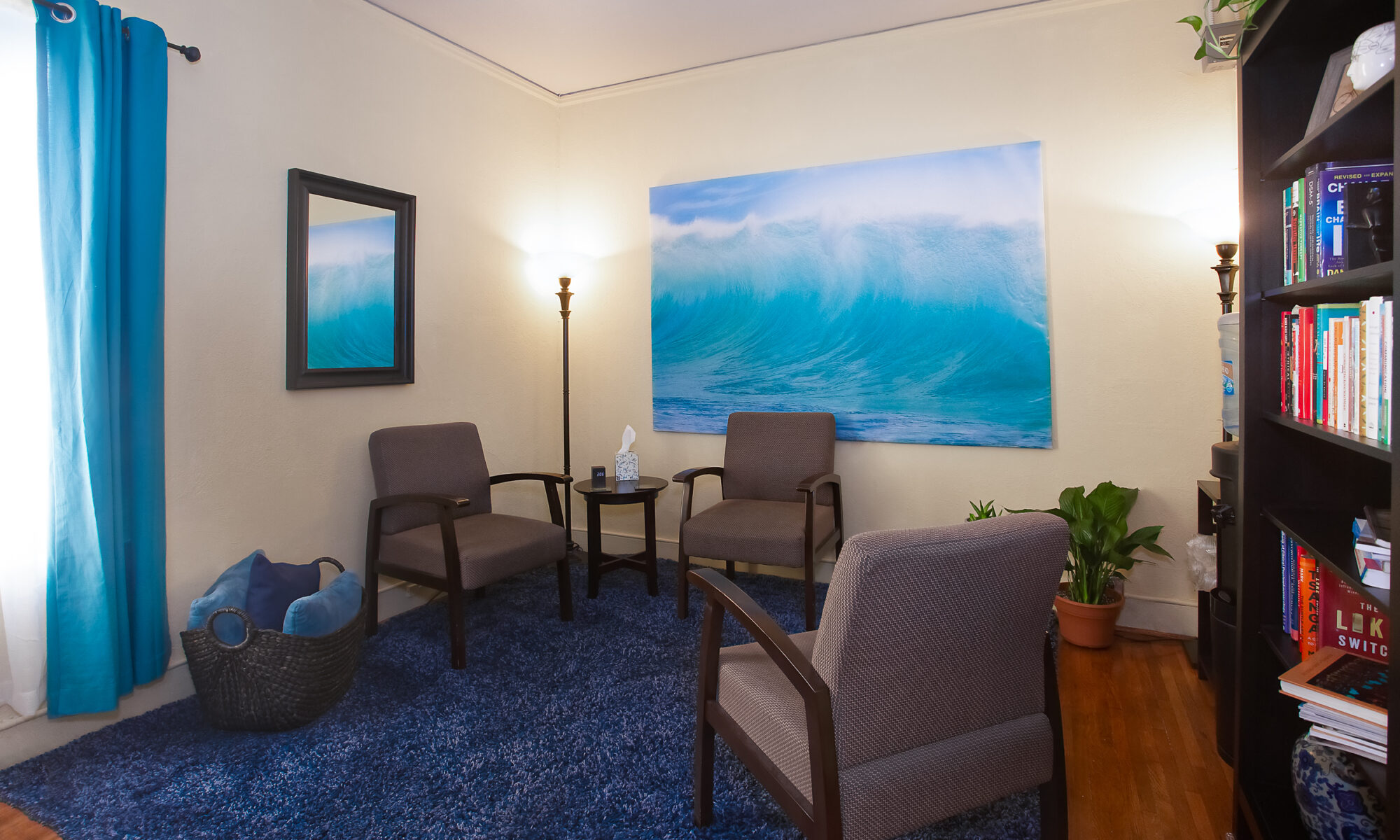
Do you like who you are in your relationship?
I ask this question because, despite what many think, relationships rarely end because we fall out of love with the person we are with–more often breakups happen because we don’t love who we are in the relationship. What makes us fall out of love with ourselves at times in our lives? For our purposes I want to focus on the words, thoughts, and actions that can work against our values.
When we engage in behaviors that don’t align with how we prefer to be in the world, we become unsettled, and the easiest way out is to look for someone to blame for this unpleasantness. Guess who usually gets the blame? When something happens in the world that keeps us close to our partners for long periods of time, unsettled feelings can get triggered and magnetized. What do we do with them? How do we talk to our partners about what we are feeling without projecting blame? When do we know if talking will help, or if we should just break up?
Believe it or not, the most helpful approach to answering these questions begins with looking at yourself, not your partner. This is because our responses and reactions tell us a lot about how we experience the world, and if we are not satisfied with the results of that perspective, then we have an opportunity to change it. There is a greater chance for success with changing the self than there is with changing someone else! The challenge is that changing the self is hard and sometimes more painful than trying to get someone else to change, but it is the only way I know that works for the long run. So let’s look at how we determine where the change needs to happen: in us or in the state of our relationship…
FOR BETTER OR WORSE: As I wrote above, we often break up because we no longer love who we are in our relationship, meaning that we don’t like how we are responding to what we don’t like in the other. When we say that we promise to stay together “for better or worse”, we are actually talking about the future state of the other, the relationship, and ourselves.
In the courtship phase it is easy to imagine sticking with someone for the long run because the version of that person in the moment is quite enjoyable. This makes it easy for us to show up as caring and kind to the other–we are our best self. We love our relationship most when we feel like a better version of ourselves in it–not so much when we feel like a worse version!
What factors into these opposing experiences of the self? It is not difficult to be a better version of ourselves when the relationship is humming along nicely. Not so easy when going through a rough patch. Why is this? Often it is because rough patches trigger our fears, vulnerabilities, and in worst case scenarios, our negative beliefs about ourselves. When this happens, our better self, the one who acts lovingly toward our partner, disappears, and our priority shifts to protecting ourselves at any cost. We stop loving and instead attack, defend, or retreat, intent on survival.
How do you have access to your better self regardless of what is going on in your relationship?
THE FUNERAL EXERCISE: The ability to have consistent access to our better self is dependent on these key steps:
-
- a strong and appealing vision of our better self and how our relationship would benefit from us showing up as that
- awareness of the cost of leaving our better self, both to us and to our partner
- ability to self-regulate ourselves and/or be co-regulated by our partner
- ideally, a partner who is willing and enthusiastic about teaming up with you to support you being your better self
You might be wondering how you even figure out what your better self looks like. Let me tell you a story…
Many years ago I participated in a series of workshops that could be categorized as “self-actualization” workshops. It was the 90’s! I remember that one night the group of participants were gathered, and we embarked on an exercise that is sometimes called “The Funeral Exercise”. Over the course of the evening, we all had the opportunity to lay on the floor of the room and pretend that we were dead and buried. We were then instructed to imagine that our loved ones were above us, attending our funeral, and we were told to think about what they might be saying about us and the life we lived.
This exercise changed my life, because at the time the conversations I imagined happening above my buried body were not flattering! There was a lot of “He was so closed off” and “He lived so carefully”, and I remember imagining that my mother was there, crying because I had kept her at arm’s distance. In other words, I realized that I was not living my best life, I was not being my better self. I was letting fear influence me to protect myself from being hurt, which resulted in me keeping out love along the way.
Today, I no longer prefer protecting myself to feeling alive and in relationship to others.
After the workshop, things did not turn around immediately in my life, but they did begin to shift. And what helps to bring my better self to relationships more consistently today is the desire to live a life that is a celebration while I am living it, and celebrated after it is over. The motivation to do this is simple: I want to feel more love and less pain. I realized that by avoiding pain at all cost, I was also avoiding love, which then reinforced the pain. A very vicious cycle.
TURNING PAIN INTO MOVEMENT: What is the turning point for most people–that time when they decide to make changes in how they are living live and relating to others? In the popular play A Christmas Carol, the change happens overnight for the main character, but we can’t all have the benefit of a set of ghostly visits to spark us into action! I have observed that turning points often come when the pain becomes unbearable–when the balance between what we gain and what we lose is tipped toward loss.
This is the time that most people seek out therapy. How can therapy help? Ideally, it does not give you the answers, it instead leads to better questions. These questions hopefully influence your relationship to yourself, others, and your values. This process can also increase awareness in one’s own choices, bringing recognition that we are making choices more often than we think!
Mindfulness, as this awareness if often called, invites us to live intentionally rather than reactional. Intentional living has a greater chance of leading you to your better self, since you can not only accept or reject painful choices, you can also adjust your response to pain by being aware of how you are thinking about it. This is what is known as taking accountability not for what life is, but for how you experience it–becoming the author of your own life.
(Read more about becoming the author of your life HERE.)
Our better selves don’t just fall into our laps–we realize them by first identifying what that will look and feel like, and then surrounding ourselves with those who support our movement in that direction. This is why it is critical to choose a partner who supports your vision of your better self–a partner who even inspires that vision.
Peter Pearson, Ph.D. of the Couples Institute says that we have been measuring success in relationships all wrong. He says that rather than defining success by the amount of positive change in our partners, we should define it by the amount of positive change in ourselves. Meaning: Are you a better person today in your relationship than you were yesterday?
This is a powerful question, because it requires that you accept accountability for your life, and that you take responsibility for whether you are enjoying it or not. It does not mean that you can’t seek change in others, just that you realize the path to that change is through influence, not demands. We influence our partner to be better by being better ourselves. If this does not happen, then there may be other issues at play, but at least we won’t blame the other for how our life is turning out. It is more likely that at our funeral our loved ones will celebrate who we have been instead of mourning who we could have been.
***
Philosophers have been exploring what makes a good life for centuries now, and fortunately we have the benefit of their musings, but it takes more than reading a book to have a good life. We have to live it. The motivation to do so comes from imagining what it would feel like to live a good life–we are driven by our emotions, not our thoughts–thoughts may spark feelings but they rarely motivate on their own (try “thinking” your way to exercise!).
The reason to live a good life, your better life, is pretty simple: it feels good! A better life is not about being “good”, it is about being better, and you get to decide what that looks like for you. Rather than figuring this out on your own, you can use your relationships as a guide–noticing what works and what doesn’t with others and exploring how each of those feel to you. (For example, we may not hold “honesty” as an element of our better self until we are lied to and we experience the pain of that.)
And every evening before you go to sleep, you can ask yourself, “Was I better today than I was yesterday?” If not, you can adjust course tomorrow, ensuring that your focus is on changing what you actually have control over. When you are a better version of yourself, you will naturally become a better partner, which will aid them in being a better person, and so it goes. Now that is a cycle I can get behind!
